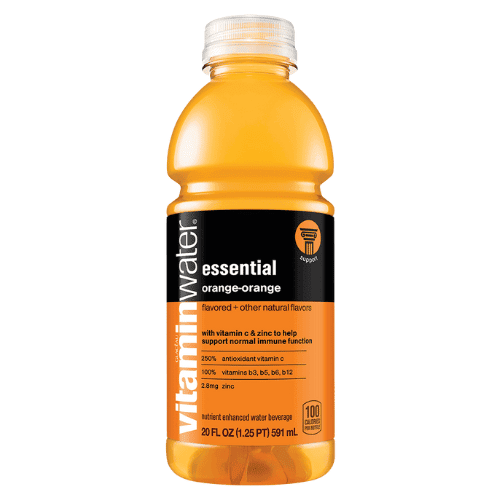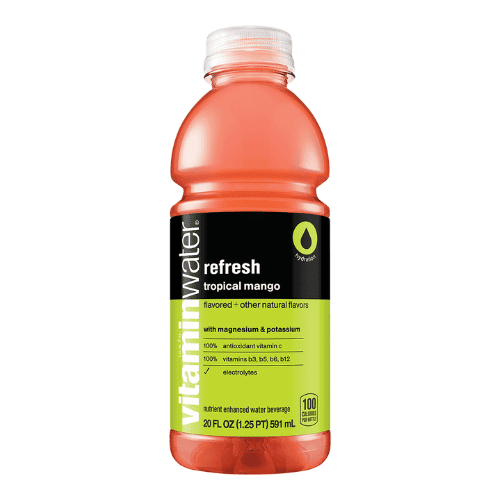“Does Vitamin Water contain electrolytes?” is a question many consumers ask as they try to understand their beverage’s nutritional content. Vitamin Water has been marketed as a healthy drink, with electrolytes being a major selling point. This article will delve straight into Vitamin Water’s composition, focusing on its electrolyte content.
We’ll provide straightforward, scientifically-backed information to aid your understanding of this popular beverage’s nutritional profile. Whether you’re an athlete, a health enthusiast, or a curious consumer, this resource will answer your queries about Vitamin Water and its electrolyte content.
Does Vitamin Water Contain Electrolytes?
The exact electrolyte content can vary slightly depending on the specific flavor or variant of Vitamin Water.
However, the primary electrolytes typically found in most Vitamin Water products are:
1. Potassium: Often listed as monopotassium phosphate in the ingredients, this mineral helps regulate fluid balance, nerve signals, and muscle contractions in your body.
2. Magnesium: Usually listed as magnesium lactate, it’s vital for many of the body’s metabolic processes and assists with nerve function and muscle contraction.
3. Calcium: Often listed as calcium lactate, this mineral is crucial for bone health and aids in muscle function.
4. Sodium: Listed as sodium citrate.
What Are Electrolytes & Why Are They Important?

Electrolytes are minerals that have an electrical charge when blended in water and are obtained from the foods and fluids one consumes. They are then distributed throughout the body and use electrical energy to facilitate basic bodily functions like walking, breathing, and even cognition:
The six principal electrolytes include:
- Calcium
- Chloride
- Magnesium
- Phosphate
- Potassium
- Sodium
When a person sweats, especially during activities like exercising, sports, intense physical activities, and staying in high temperatures where you tend to lose the most fluids, they lose valuable electrolytes that must be replenished. Otherwise, electrolyte imbalances may occur. So, it’s crucial to stay hydrated throughout the day.
Electrolytes can help boost exercise performance, support nervous system function, and even prevent heatstrokes.
What Is The Electrolyte Breakdown of Vitamin Water?

Most electrolyte drinks have at least sodium, potassium, and magnesium as their three key electrolytes. According to Vitaminwater’s nutrition facts, it contains three electrolytes – calcium magnesium lactates, potassium phosphate, and sodium citrate.
Calcium helps the muscles to move and for nerves to carry messages between your brain and every part of your body, as well as strengthen bones. Magnesium lactate supports heart health and benefits the nervous system, while potassium phosphate prevents excessive calcium levels and kidney stone formations, and supplements phosporus levels in the body.
Both calcium and phosphate are essential electrolytes that have a reciprocal relationship to maintain balance. If the concentration of one increases, the other decreases, and if the concentration of one decreases, the other increases.
While the body only needs a relatively small amount of sodium in its system, the absence of sodium in Vitaminwater is notable. As an electrolyte, sodium is responsible for maintaining the balance of body fluids and keeps the muscles and nerves running smoothly, which means, not having sodium may diminish the effectivity of this electrolyte beverage.
What Is Vitaminwater?

Vitaminwater is an electrolyte drink popular with athletes and fitness enthusiasts. It was first distributed in 2000 by Glacaeu, owned by businessman Mike Repole, before being bought by The Coca-Cola Company in 2007.
Comparing Vitamin Water To Other Electrolyte Sources
Electrolyte Content and Ratios
The electrolyte content and ratio can affect a beverage’s efficiency in hydration and replenishing lost electrolytes. Individually, everyone might have different needs based on their health condition; some who may need more or less of certain electrolytes.
Here’s how Vitaminwater fares compared to other popular electrolyte beverage brands:
| Sodium | Potassium | Magnesium | Calcium | |
| LMNT | 1000 mg | 200 mg | 60 mg | 0 mg |
| Liquid IV | 500 mg | 370 mg | 0 mg | 0 mg |
| Vitaminwater | 0 mg | 140 mg | 40 mg | 175 mg |
None of the products contain all six major electrolytes, with Vitaminwater and LMNT having three and Liquid IV only two. Regarding their electrolyte ratios, we can see that Vitaminwater’s electrolyte content is noticeably lower compared to both LMNT and Liquid IV, meaning that its content and ratio render it too low to be effective or deliver results.
Sugar Content
Vitaminwater variably uses crystalline fructose, sucrose, stevia leaf extracts, and erythritol as sweeteners. Crystalline fructose, the main sweetener, is a naturally occurring substance found in fruits, vegetables, and honey, and is sweeter than regular sugar and low in glycaemic index (GI). Coca-Cola, Vitaminwater’s manufacturer, also uses crystalline fructose in Coke.
Each bottle contains about 32 g of sugar (its sweeteners considered). It must be noted that crystalline fructose has approximately double the amount of fructose when compared with high fructose corn syrup. Excessive levels of crystalline fructose may still result in health problems like high blood sugar and liver damage.
Erythritol and stevia leaf extract, both present in the zero sugar variants, may also increase one’s appetite unhealthily and promote unhealthy weight gain, among other health problems. In some occasions, stevia may also cause gastrointestinal issues, low blood sugar levels, and disruption in the endocrine system.
Other Ingredients
Vitaminwater uses reverse osmosis water. This kind of water undergoes a purification process that removes disease-causing contaminants like bacteria, organic compounds, chemicals, and heavy metals from unfiltered water when forced by pressure to go through a semipermeable membrane. Overall, it’s beneficial to the liver and kidneys and promotes cleaner blood.
One notable downside to the purification process is that it also removes healthy minerals possibly present in the water and decreases pH levels. This process also tends to waste a lot of water in the long run.
Vitaminwater contains zero caffeine and is free from major allergens like dairy, shellfish, nuts, eggs, and soy. It’s suitable for vegetarians and vegans alike.
Alternatives to Vitamin Water for Electrolyte Replenishment
Eating Foods Rich In Electrolytes
Eating a diet composed of foods rich in electrolytes is a great way to meet your daily nutrient needs.
- Turkey
- Chicken
- Veal
- Fish
- Spinach
- Kale
- Broccoli
- Potatoes
- Beans
- Almonds
- Peanuts
- Soybeans
- Tofu
- Avocados
- Strawberries
- Watermelon
- Oranges
- Bananas
- Raisins
- Olives
- Tomatoes
- Milk
- Buttermilk
- Yogurt
- Seafoods
How To Choose An Electrolyte Drink
Before opting for an electrolyte brand/beverage, consider the following things in mind:
- Ingredient Content – Consumers should look first into the ingredients and their content before settling on a product that suits them best. Those who sweat heavily may benefit more from a product with higher sodium content, while people who are more prone to muscle cramps might benefit from one with more potassium.
- Sugar Content – The body processes sugar too quickly – it leaves you with an initial energy source that is quickly used up and followed by a crash, leaving you feeling lethargic. Dietitians recommend having less or zero sugar to avoid crashes and increased energy levels.
- Palatability – Most electrolytes come in multiple flavors, often mimicking fruit juices. Having a variety of flavors makes taking electrolytes more tolerable and palatable.
Make Your Own Electrolyte Drink
You can make your natural electrolyte drink right in your home. The ingredients are easy to find and prepare, that way, you can save money and avoid artificial ingredients and high sugar contents in the long run.
Most electrolyte concentrates recipes require a combination of sodium, sugar, and citrus, but you can replace sugar with honey, maple syrup, coconut sugar, monkfruit extract, or non-nutrisweeteners like stevia. Adding baking soda and iodized salt help replace different forms of sodium that are lost through sweat, while citrus fruit contains potassium and magnesium.
To make an electrolyte concentrate, prepare the following:
- Half a dozen lemons (or any citrus fruit of your choice)
- Sugar (Or sweeteners like honey, maple syrup, or stevia)
- 1 teaspoon of iodized salt
- ½ teaspoon of baking soda
Procedure:
– Juice the citrus fruit thoroughly and put the contents in a small bowl (To extract more juice, put the fruit in a microwave for about 30 seconds)
– Add a sizeable amount of the sweetener and mix in the salt and baking soda.
– Mix the contents well to settle the fizzing.
– Keep the concentrate in the fridge in a tightly capped jar. Freeze the blend into popsicles works too.
You can add small amounts of this blended concentrate to plain water whenever needed. Avoid using store-bought fruit juices, since they contain a lot of sugar.
Recap
- Vitaminwater is a popular electrolyte beverage currently manufactured by The Coca-Cola Company.
- The beverage contains calcium, magnesium lactates, and potassium phosphate, but has no sodium, which can affect efficiency in hydration.
- Vitaminwater a considerably high amount of sugar – 32 g, which is already half the sugar content of a Coke can.
Conclusion
The body needs proper hydration to maintain adequate fluid and electrolytes to function properly, and sports drinks and electrolyte powdered packet drinks can give proper hydration and balance electrolyte levels.
Despite being an increasingly popular electrolyte drink, Vitaminwater may not be the ideal choice given its lower electrolyte content and high sugar content. Other brands like Liquid IV, Dripdrop, or LMNT, appear to be more promising and effective.
But do note that one should never use electrolyte drinks or substitute water for hydrating the body. A proper diet and healthy lifestyle should always accompany it to see its desired benefits.
Disclaimer: this article does not constitute or replace medical advice. If you have an emergency or a serious medical question, please contact a medical professional or call 911 immediately. To see our full medical disclaimer, visit our Terms of Use page.










